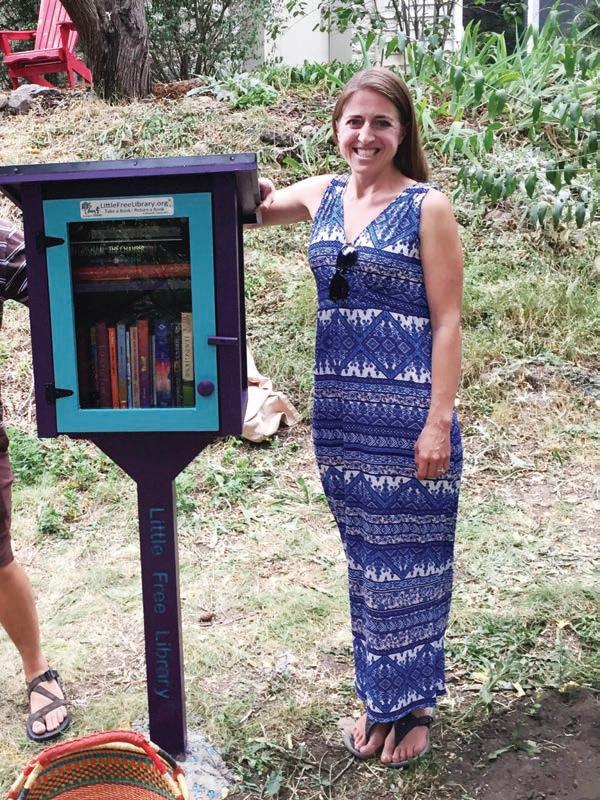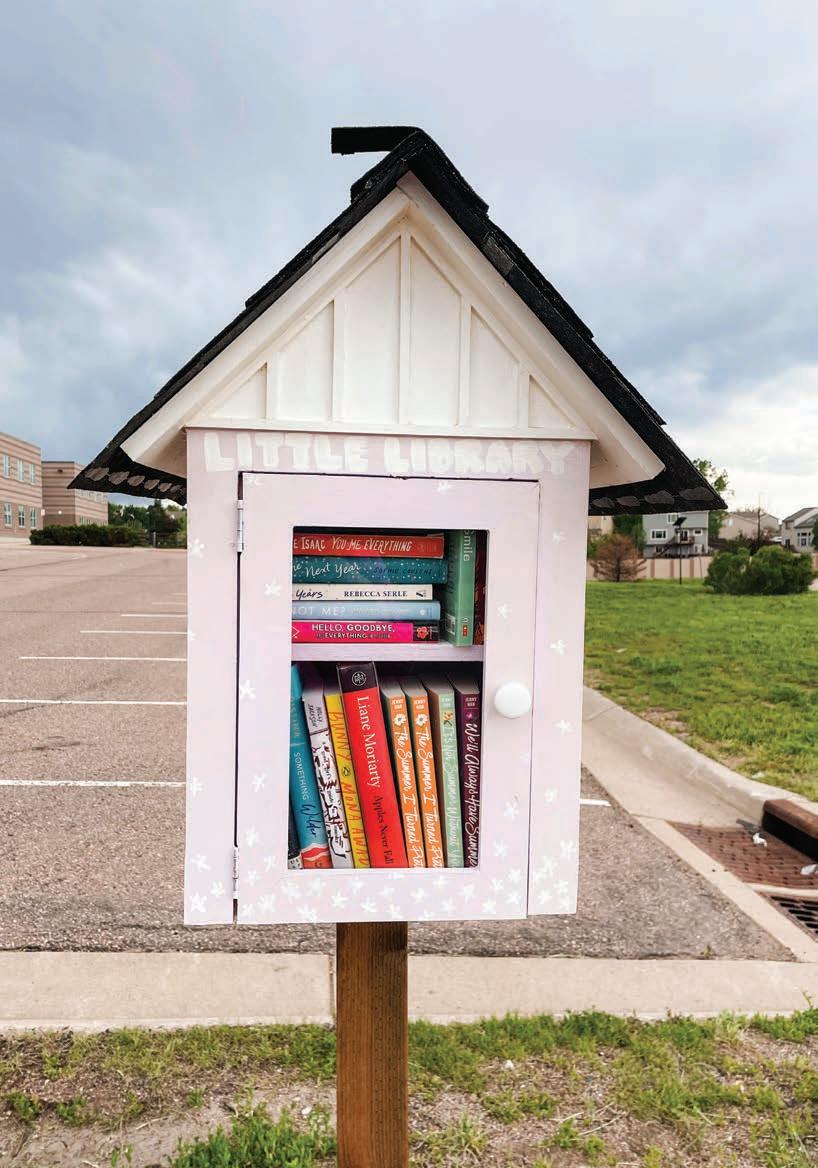
6 minute read
DOBBS
25,000 visits in their homes. For the clinicians, that meant almost 9,000 hours of just driving . Like the legendary postman, neither snow, nor rain, nor heat, nor gloom of night stops these clinicians from their appointed rounds.
One therapist, Isabelle Comina, tells the story of a Friday afternoon when saw a patient in Idaho Springs, then headed west for her nal stop of the day, a 4 p.m. appointment with a patient in Georgetown. But suddenly, when Isabelle was only about twenty cars short of an o ramp that would get her to the frontage road, the tra c stopped cold. e way she put it is, “Not able to go forward, not able to go back, not able to go to the bathroom.” She nally reached her patient at 7 p.m.
A registered nurse named Teri McLaughlin lives in Blackhawk but in the middle of one night during a snowstorm, as the nurse on call, her phone rang telling her that a hospice patient in Bailey was in the last stage of death. She got in her car at 1 a.m. and got there at 4 a.m.
Reed Brandenburg, a physical therapist, usually works the I-70 corridor and had to reach a patient on a road near St. Mary’s Glacier that even the locals said he shouldn’t even attempt to use after a snowstorm. But he had to get there, so he parked at the bottom of a hill and snowshoed in the better part of a mile with his supplies — all the paraphernalia the rest of us
Guest Column
on Aging, people age 65 years and older are more prone to heatrelated problems, as our bodies do not adjust as well to sudden changes in temperature like they did when we were younger. In addition, older adults are more likely to have chronic medical conditions and/or more likely to be taking prescription medications that can a ect the body’s ability to control its temperature or sweat. Being overheated for too long or exposed to the sun without protection can cause many health problems including: would see in a PT’s o ce — on his back. ese Mount Evans clinicians drive the worst roads in the four counties they serve. ey navigate the notorious Oh-My-God Road. ey climb steep twisty dirt driveways that have turned to ice. Some days they have to put on crampons to make it up the last hundred yards. ey go where they’re needed no matter where they live, no matter where they are, no matter what time of day or night, no matter what the weather.
• Heat syncope: sudden dizziness that can occur when active in hot weather.
• Heat cramps: painful tightening or spasms of muscles in the stomach, arms or legs.
• Heat edema: swelling in ankles and feet when you get hot.
And they go where there’s no cell service, which mainly means the outer reaches of Gilpin and Park Counties. Because they have to be kept apprised when they’re on their way about any changes in a critical patient’s condition, and because they have to keep Mount Evans apprised if they have a mishap like sliding into a ditch, which has happened, there is an administrator on call 24/7 who they call when they know they’re about to lose cell service, and when they get it back. ey can’t do any of this if they don’t drive to where the patients are. at’s part of the reason Mount Evans fundraises: https://mtevans. org/support-mount-evans/donate/. No one else pays for those 310,880 miles its clinicians travel. It has to pay every penny itself.
Greg Dobbs is a three-time Emmy Award winner who worked as a political and foreign correspondent for two television networks. He also wrote weekly columns for the Rocky Mountain News, then e Denver Post. Dobbs and his family have lived in Evergreen for 37 years.
• Heat rash: skin irritation from heavy sweating that causes red clusters of small blisters that look similar to pimples on the skin.
• Heat exhaustion: a warning that your body can no longer keep itself cool. You might feel thirsty, dizzy, weak, uncoordinated and nauseated. You may sweat a lot. Your body temperature may stay normal, but your skin may feel cold and clammy. Some people with heat exhaustion have a rapid pulse. Heat exhaustion can progress to heat stroke. If you or someone you are with begin to show any signs of heat exhaustion, move to a cooler environment as quickly as possible — preferably a well airconditioned room. Loosen clothing, sponge o or bathe with cool water, lie down and rest.
• Heat stroke: a medical emergency in which the body’s tempera- ture rises above 104°F. Signs of heat stroke are fainting; confusion or acting strangely; not sweating even when it’s hot; dry, ushed skin; strong, rapid pulse; or a slow, weak pulse. When a person has any of these symptoms, they should seek medical help right away and immediately move to a cooler place, such as under shade or indoors. ey should also take action to lower their body temperature with cool clothes, a cool bath or shower, and fans. But the added risks don’t mean you have to stop doing the things you love. It just means taking the time to prepare for your outdoor fun. Some of the most e ective preventive measures include:
• Wear sunscreen (SPF 15 or higher).
William “Bill” Austin passed away on July 19, 2023 at the age of 78 after a short, but tough battle with cancer. He was born on February 17, 1945, and was the son of Roxie and Bill Austin. He spent his early childhood in Hot Springs, Arkansas with his two younger sisters Pat and Barb. Later, the family of ve settled in Arvada in 1956. Bill’s life was full of accomplishments. He was a talented wrestler. He was a League and District champion and wrestled in the nals for the State Championship for the Arvada Redskins. At Northeastern Junior College, he was named Junior College All American wrestler and was part of the 1964 National Championship team. He earned an Associates from NJC and a Bachelor’s degree from Colorado State College. His careers included driving buses, National Guardsman, and Master Plumber. He retired from the city of Arvada after having been a Building Inspector for 23 years. Bill was a proud member of the Arvada community since 1956 with deep roots and friendships that lasted his lifetime. His life-long love of shing earned him the selection. ese moments never fail to make her smile.
Austin family record with a 42-inch, 26-pound muskie.
No other accomplishment could compare to the love and devotion he had for his family. Bill met the love of his life, Kathy, in high school and they were married for 57 years. ey literally built a home and life together with their two children, Heath and Kaylynn. e family expanded with in-laws Brad, and Sandy who he treated as his own. His pride and joy became his grandchildren, Annabeth, Case, Briar, and Bray.
Bill is survived by his wife Kathy, children Heath Austin (Sandy), Kaylynn Johnson (Brad), sister Barb Roark (Tim), brother-inlaw Russ Mayer, sister-in-law Barb Stolte, and countless nieces and nephews. Bill was preceded in death by his parents, Bill & Roxie Austin and his sister Pat Mayer, and his beloved dog Enders.
A funeral service in honor of Bill’s life will be held on July 26, 2023 @ 1:00 p.m. at Horan and McConaty @ 7577 W. 80th Ave., Arvada 80003 followed by a reception at the house that Bill, family, and friends built.
“It brings me just a ton of joy to see people enjoying it and enjoying the space,” Monson said. “I think it’s also enriched my kids’ love and appreciation for literature because they get so excited about nishing a book and passing it on.”
Monson built her library in 2017 and registered it with Little Free Library, a Minnesota-based nonpro t that aims to increase access to literature by providing blueprints and guides to build community libraries, as well as mapping registered libraries across the country.


Hundreds of little free libraries have popped up across the Denver metro area as their popularity proliferates. Monson said she was inspired to build her library after visiting others with her 11-year-old twins Tommy and Luci, who are avid readers.
“I really believe in the importance of building community and connection for wellness, so I thought it was a great way to build community shortly after we moved to Golden,” she said. “So it was their love of reading and my want to build community that made it happen.”
Since the library is on a bike and walking path, it’s not accessible by car, so Monson took advantage of the unique environment by adding a bench, a slide and fairy gardens around the library to make it an inviting spot for visitors.






